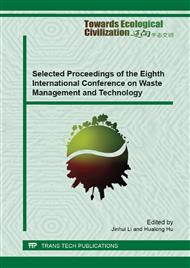[1]
A.A. Khan, Z. Ahmed, M.A. Siddiqui, Issues with Solid Waste Management in South Asian Countries, Journal of Environmental and Occupational Science, 2012. 1(2) 129-131.
DOI: 10.5455/jeos.20120731084356
Google Scholar
[2]
E.G.W. Gunawardana, B.F.A. Basnayake, S. Shimada, T. Iwata, Influence of biological pre-treatment of municipal solid waste on landfill behaviour in Sri Lanka. Waste Manag Res. 2009, 27(5) 456–462.
DOI: 10.1177/0734242x08095565
Google Scholar
[3]
The Constitution of the Democratic Socialist Republic of Sri Lanka, (1978).
Google Scholar
[4]
Ministry of Environment and Natural Resources, National Strategy for Solid Waste Management, Sri Lanka, 1999, p.22.
Google Scholar
[5]
A. De Alwis, Solid Waste Management in Sri Lanka, A Country perspective. In Grover, V.I., Guha, B. K., Hogland, W., Mc Rae,S. G. (Eds), Solid Waste Management. A. A. Balkema, Rotterdam, Brookfield, VT, 2000, pp.203-233.
Google Scholar
[6]
Urban Development Authority, Areas declared under Urban Development Act as at 20th October 2011 and Major Cities, New Declared Areas, www. uda. lk-Official Web site of then Urban Development Authority of Sri Lanka, (2012).
Google Scholar
[7]
Ministry of Environment and Natural Resources, National Environmental Policy and Strategies, Sri Lanka, (2003).
Google Scholar
[8]
Ministry of Environment and Natural Resources, National Solid Waste Management Policy and Strategies, Sri Lanka, (2007).
Google Scholar
[9]
Ministry of Industry and Commerce, National Cleaner Production Policy, Sri Lanka, (2004).
Google Scholar
[10]
Central Environmental Authority, Technical Guidelines on Solid Waste Management in Sri Lanka, (2005).
Google Scholar
[11]
Central Environmental Authority, Guidelines for the Management of Scheduled Waste in Sri Lanka, Sri Lanka, (2009).
Google Scholar
[12]
C. Visvanathan, J. Trankler, Municipal Solid Waste Management in Asia: A comparative analysis, Sustainable Landfill management workshop, School of Environment Resource and Development, Chennai, India, 2003, 3-15.
Google Scholar
[13]
S.M.S.R. Kumari, N. J. G. I. Bandara, Release of Methene and Corbon Dioxide gases from municipal solid waste landfills in the Colombo Metropolitan Region, Ninth Annual Forestry and Environmental Symposium, University of Sri Jayawardanapura University, (2004).
Google Scholar
[14]
N.J.G.J. Bandara, K.M.W.G. Kandawinna, K.M. Mohotti, Comparison of Compost derived from different sources for agricultural purposes, SLAAS Annual Session, Colombo, (2004).
Google Scholar
[15]
Ministry of Environment and Natural Resources, Database of Municipal Waste in Sri Lanka, (2005).
Google Scholar
[16]
Central Environmental Authority, Survey on Municipal Solid Waste in Sri Lanka, 2010-2011 l2(Unpublished data).
Google Scholar
[17]
Regional Resource Center for Asia and Pacific, Sri Lanka: State of Environment 2001, Asian Institute of Technology-A UNEP Collaborate Center, (2001).
Google Scholar
[18]
National Dengue Control Unit of Sri Lanka. Description of Aedes larvae positive containers in premises house gardens, (2012).
Google Scholar
[19]
N.J.G.J. Bandara, Applicability of Composting for Municipal Solid Waste Management in Sri Lanka, Journal of Environmental Research and Development. Vol. 4(4) (2010).
Google Scholar
[20]
Asian Productivity Organization (APO), Solid Waste Management: Issues and challenges in Asia. Edited by the Environmental Management Center, Mumbai, India, (2007).
Google Scholar
[21]
Metropolitan Environmental Improvement Project, ERM, Consultancy Services on Feasibility Survey on Hazardous Waste Management and Disposal Generation for Sri Lanka, (1996).
Google Scholar
[22]
R.V. Berkel, Background Paper on Cleaner Production perspective for the next decade, Sixth International high level Seminar on Cleaner Production of UNEP, Montreal, Canada, 16-17 October (2000).
Google Scholar
[23]
World Bank, Solid Waste Management in Asia. Washington DC: The International Bank for Construction and Development/World Bank, 1999 (20433).
Google Scholar
[24]
Y. Geng, Q. Zue, M. Haight, Planning for Industrial Waste Management at the industrial part level: A case of Tiangin, China, Waste Management, 27 (2007) 141-150.
DOI: 10.1016/j.wasman.2006.07.013
Google Scholar
[25]
M.L. Casares, N. Uietre, A. Mataran, A. Ramos, N. Samorano, Solid industrial waste and their management in Asegra, Granada, Spain. Waste Management, 2005, 25, 1075-1082.
DOI: 10.1016/j.wasman.2005.02.023
Google Scholar
[26]
World Health Organization, Waste from Healthcare Activities, Factsheet No 253, Media Centre, (2011).
Google Scholar
[27]
Ministry of Health, Environmental Management Framework for Healthcare Waste and Infrastructure Development (Draft), Second Health Sector Program, (2012).
Google Scholar
[28]
M.A.S.C. Samarakoon, N.S. Gunawardena, An Evaluation of Health Care Waste Management in Base Hospitals of Colombo District. Journal of the College of Community Physicians of Sri Lanka, 16(2), (2011) 15-20.
DOI: 10.4038/jccpsl.v16i2.4576
Google Scholar


